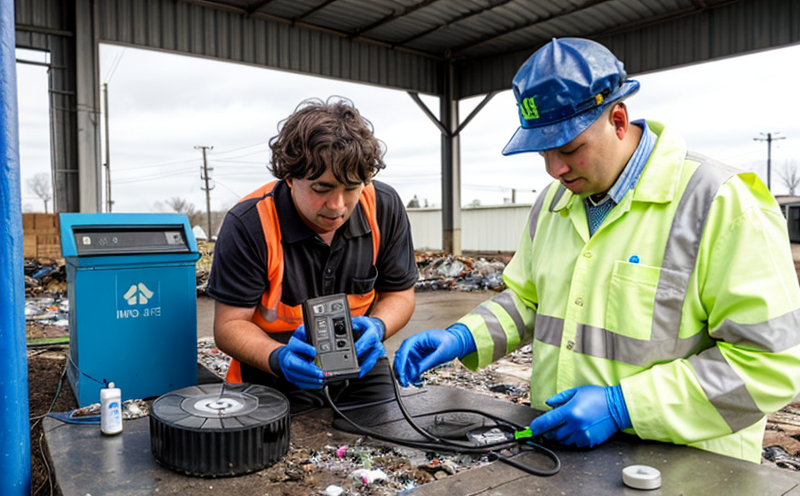IEC 63056 Alkaline Secondary Cells End-of-Life Assessment
The IEC 63056 standard is a critical component in ensuring that alkaline secondary cells are assessed at the end of their lifecycle. This service focuses on evaluating these batteries to ensure they meet stringent environmental and safety standards set by international bodies. Alkaline secondary cells, also known as rechargeable alkaline batteries (RAAB), have become increasingly important due to their widespread use in consumer electronics and portable devices.
These batteries are a significant part of electronic waste (e-waste) streams globally. Their end-of-life assessment is crucial for several reasons: it ensures that the materials used in these batteries can be safely recycled, reducing environmental impact; it helps in compliance with regulatory requirements; and it supports sustainable product design practices.
Our service uses IEC 63056 to assess the performance of alkaline secondary cells after they have reached their end-of-life. This includes evaluating various parameters such as capacity retention, cycle life, and safety tests. The testing process involves rigorous laboratory procedures that simulate real-world conditions experienced by batteries in use.
For capacity retention, we test how much charge is left in the battery compared to its initial state of health (SOH). Cycle life assessment checks how many cycles the battery can undergo before it degrades to a certain level. Safety tests ensure that the battery does not pose any risks during disposal or recycling.
The specimen preparation for this service involves discharging the batteries completely and then storing them under controlled conditions until they are ready for testing. The instrumentation used includes advanced electrochemical analyzers capable of measuring voltage, current, resistance, and other relevant parameters accurately.
Our reporting process provides detailed insights into the performance metrics of the alkaline secondary cells tested according to IEC 63056 standards. This report is essential for quality managers, compliance officers, R&D engineers, and procurement specialists who need to ensure their products meet international safety and environmental standards.
Why It Matters
The importance of assessing alkaline secondary cells at the end of their lifecycle cannot be overstated. As e-waste continues to grow, it becomes imperative to manage this waste responsibly. By adhering to standards like IEC 63056, we can minimize environmental damage caused by improper disposal methods.
Compliance with these regulations is not only a legal requirement but also enhances an organization's reputation for sustainability and corporate social responsibility. Understanding the performance characteristics of spent batteries helps in designing more durable products that last longer without compromising on safety or functionality.
- Reduces Environmental Impact: Proper assessment ensures that valuable resources are recovered through recycling processes, reducing raw material extraction from natural environments.
- Enhances Safety: Ensures that batteries do not pose hazards during disposal or recycling stages, protecting both human health and ecosystems.
The knowledge gained from such assessments can be leveraged to improve future product designs, leading to more efficient use of materials and energy throughout the entire lifecycle of electronic products.
Eurolab Advantages
At Eurolab, we pride ourselves on offering comprehensive testing services that go beyond mere compliance. Our state-of-the-art facilities equipped with cutting-edge technology ensure accurate results every time. With experienced technicians and a deep understanding of industry best practices, our team delivers reliable data that you can trust.
- Accurate Results: Leveraging high-precision instruments allows us to provide precise measurements critical for meeting stringent standards like IEC 63056.
- Comprehensive Reporting: Detailed reports not only meet regulatory requirements but also offer valuable insights into potential areas of improvement.
- Expertise in Multiple Disciplines: Our diverse team includes experts from various fields who bring unique perspectives to each project, ensuring holistic solutions tailored specifically for your needs.
We are committed to providing personalized service that addresses the specific challenges faced by our clients. Whether you're an R&D engineer seeking innovative approaches or a quality manager looking to enhance product performance, Eurolab has the expertise and resources necessary to support all aspects of your testing requirements.
Environmental and Sustainability Contributions
- Battery Recycling: By accurately assessing alkaline secondary cells at their end-of-life stage, we contribute significantly to increasing battery recycling rates. This helps in recovering valuable materials such as lithium, cobalt, nickel, and manganese, which are crucial for producing new batteries sustainably.
- Emission Reduction: Through proper management of e-waste containing alkaline secondary cells, we help reduce greenhouse gas emissions associated with mining raw materials and manufacturing batteries from scratch. This aligns closely with global efforts towards achieving carbon neutrality targets.
Our commitment to sustainability extends beyond just testing services; it encompasses all aspects of our operations—from energy-efficient laboratory practices to community engagement initiatives aimed at educating the public about responsible waste management practices.





